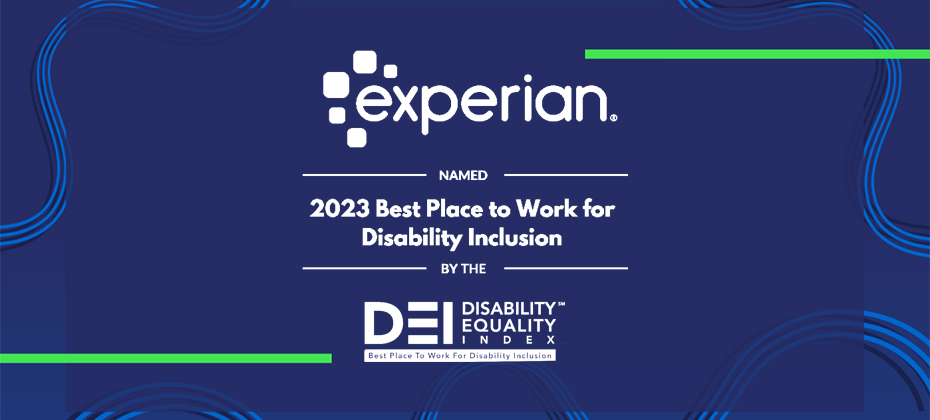News
What’s happening in our industry and what we’re doing

You may have recently read that Experian®, alongside the other two credit bureaus, permanently extended free weekly access to consumer credit reports through AnnualCreditReport.com. While I believe the move helps consumers more regularly review their credit reports, it only begins to scratch the surface of how we empower consumers to take control of their financial lives. People come to Experian looking for ways to improve their financial health. We have direct relationships with millions of consumers and listen to their wants and needs. That’s why we’ve transformed ourselves into the one stop shop for our members to address many facets of their financial journey. Whether it’s accessing credit education materials, monitoring their credit files, finding ways to save money or improving their credit history, consumers can come to Experian to find the tools and resources they need. Building creditFor instance, in 2019, we launched Experian Boost® --a first-of-its-kind feature that allows consumers to contribute positive payment information for eligible bills including utilities, telecom and even video streaming services, directly into their Experian credit file. Consumers can now also add positive residential rent payments through Experian Boost®1. More recently, we debuted Experian Go™—another first-of-its-kind feature designed to help “credit invisibles,” or people with no credit history, begin building credit. Credit invisibles who utilize the feature together with Experian Boost can establish an authenticated Experian credit report, tradelines and a credit history and, as a result, get access to financial offers. Staying on top of your informationBeyond our credit building offerings, we’ve long provided consumers the opportunity to access their Experian credit report and FICO® Score2, free-of-charge. By providing consumers access to their credit report and FICO® Score, we’re enabling them to better understand how they may look to lenders, identify potential fraud, determine the specific factors that are affecting their credit and how to improve it. In addition, our credit and dark web monitoring services help consumers detect whether their personal information is potentially available to fraudsters and protect against identity theft. Putting money back into your walletWe also recognize the value of saving money. As part of an Experian membership, we offer resources that can potentially help consumers save on the cost of their auto insurance and find the best credit card for their financial needs. We empower consumers to: Compare auto insurance policies. Consumers can comparison shop to potentially find a better rate on their current policy and save. The free Experian service delivers multiple, tailored rates from up to 40 leading and well-established auto insurance carriers, allowing consumers to quickly find and purchase an auto insurance coverage plan that meets their needs. Find the right credit card. Our free Marketplace makes it easy for consumers to compare different credit card options. We match consumers’ financial information against lender’s requirements to match them with the tailored offers. Every consumer deserves the opportunity to live their best financial life. Providing free resources to help consumers effectively navigate their financial journey is the best way to help them realize financial independence. While I’m proud of how we’ve helped consumers thus far, we will continue to innovate and offer consumers the tools to improve their financial wellbeing. [1] Results will vary. Not all payments are boost-eligible. Some users may not receive an improved score or approval odds. Not all lenders use Experian credit files, and not all lenders use scores impacted by Experian Boost®. Learn more. [2] Credit score calculated based on FICO® Score 8 model. Your lender or insurer may use a different FICO® Score than FICO® Score 8, or another type of credit score altogether. Learn more. [3] Results may vary and some may not see savings.

At Experian we recognize our teammates are central to our business success. By including people with disabilities in our workplace, we gain their unique perspectives and different approaches to problem solving. Experian is committed to supporting this community and we are delighted to be named a 2023 Best Place to Work for Disability Inclusion by the American Association of People with Disabilities and Disability:IN. For the second year in a row, we earned a score of 100 out of 100 in the Disability Equality Index (DEI), the world’s most comprehensive benchmarking tool that measures disability workplace inclusion. We continue to explore and prioritize ways to enhance our flexible work environment and engage with those who can help lead the charge most effectively. Creating a better tomorrow extends to third parties we work with and serve. We launched a pilot program called the Support Hub, which gives disabled people and those with additional support needs an easy, one-stop portal to tell organizations what they need to access essential services; it also helps organizations meet their obligations to better identify and support vulnerable customers. We’re proud to partner with National Disability Institute to support its Financial Resilience Center that provides information and resources to help people with disabilities and chronic health conditions build their financial resilience, and with National Disability Institute and Disability:IN to explore how financial service providers can better support equal access to financial opportunities. Our inclusion in the DEI for the third consecutive year honors the determination, creativity, and empathy of our colleagues with disabilities as we strive to be a great place to work. Learn more about Experian in its Power of YOU: 2023 Diversity, Equity and Inclusion Report.

Many times during the course of our last fiscal year, Experian was asked to describe its Diversity, Equity and Inclusion (DEI) “program.” We found this difficult to do. Because DEI isn’t just a “program” at Experian. It drives our mission, our partnerships, and our company culture. We’re happy to share our progress in the Power of YOU: 2023 Diversity, Equity and Inclusion Report. In this edition of our global report, you’ll see how our mission of financial inclusion is at the center of our products and services; how we support our consumers, clients and communities; and how we seek and attract the best talent across the world. Our teammates are key to progress and impact. Together, we drive innovations to meet consumers’ needs, such as Experian Go and our new auto insurance comparison shopping service in North America. The Support Hub pilot in the United Kingdom helps disabled people get easier access to essential services like banking and utilities. We’re proud of programs like Transforme-se in Brazil for people in vulnerable circumstances, which provide scholarships and training in STEM. In the first month, more than half of the participants improved their social and financial standing. Across the globe, partnerships with nonprofits and non-governmental organizations (NGOs) have impacted more than 18 million people so far. I hope you’ll enjoy reading the report to understand why our efforts around inclusion and belonging make Experian such a great place to work. You’ll also gain an appreciation for our ongoing focus on supporting the communities in which we live, work, and serve, and helping consumers achieve their life goals.

We are pleased to share that during last night’s annual Credit Awards, Experian scooped a special recognition award for our work supporting consumers, businesses, and the UK economy through the cost-of-living crisis. Part of this support focused on delivering financial education to marginalised groups – including younger people who were acutely feeling the pressure of rising costs and economic uncertainty. A great example of this was our work alongside the influential voices of Young Money blogger, Iona Bain, and celebrity footballer Bayo Akinfenwa, promoting credit education and helping young people take control of their financial health through a series of original videos on social media. The campaign reached over 1 million 18-25 year olds and guests at the ceremony were treated to a viewing of one of the campaign videos. In addition, Experian’s #EaseTheSqueeze campaign has been helping people manage their budgets, with tips and guidance about how they can take control of their finances. So far, we have managed to reach 8.5 million people in the UK. And, finally, our annual Credit Awareness Week campaign continues to help people develop a better understanding of credit, including how credit scoring works, dispelling common myths, and tackling issues such as credit refusal. We have also made huge strides developing an exciting pipeline of unique solutions in response to the cost of living crisis. For example, Experian’s Support Hub aims to help consumers with support needs to better connect with financial institutions and other services they need to access. By 2030, it is hoped the Support Hub will help more than 7 million disabled people. Judges from across the credit industry presided over the Credit Awards 2023, which was organised by Credit Strategy magazine and held at London’s Grosvenor House Hotel. The ‘Outstanding Company Contribution to the Industry’ award celebrates the continuous work from one company for betterment of the industry. Commenting on Experian’s win, Credit Strategy’s Group Editor Michal Lodej said: “Experian has worked tirelessly to improve the publics’ knowledge about their finances and have developed numerous tools for consumers to evaluate and improve their financial health. Their dedication to make a difference has provided much-need value for millions of people as well as the wider credit industry. For that reason, Experian were worthy winners of this year’s ‘Outstanding Company Contribution to the Industry’ award.” As the current economic environment adds extra pressure on households around the world, we recognise the significance of the role we can play to help ensure people can get through this period of financial pressure. It’s important that we continue to do all we can to keep pace, and we remain committed to equip people with the knowledge and tools to help them manage their finances effectively.

We’re very proud to have been awarded a top 75 score in the third edition of Europe’s Climate Leaders, which is compiled by The Financial Times in partnership with Statista, in recognition of our success in reducing our carbon emissions and our commitment to tackling climate change. The awards provide each company listed with a score based on their performance in cutting, and reporting transparently on, greenhouse gas emissions, as well as collaboration with environmental reporting group CDP and the Science Based Targets initiative. Our score acknowledges Experian’s ongoing commitment to reducing our environmental footprint, as we work towards our target of becoming carbon neutral in our own operations by 2030. In 2022 we continued our reduction in Scope 1 and 2 emissions and achieved a 44% reduction since 2019, as we work towards our science-based target to achieve a 50% reduction by 2030. We’re also continuing to engage with our suppliers in order to reduce the level of our scope 3 emissions through the footprint of the products and services we buy. We want to further our ambition and we are currently developing our Net Zero Transition Plan, to decarbonise our operations even further.

Today’s decision by the First Tier Tribunal substantially overturns the ICO’s Enforcement Notice issued against Experian in 2020. It represents a welcome development for the consumers, small businesses and charities across the UK that rely on the services provided by Experian. The Tribunal found, in contrast to the ICO’s Enforcement Notice, that the vast majority of our practices meet GDPR requirements, including the transparency that we provide consumers through our Credit Reference Agency Information Notice and our Consumer Information Portal. We are very pleased with this outcome. We also welcome the clarification concerning the provision of notifications to people whose data we collect solely from public records, who represent a very small percentage of our UK marketing database. We will build this into our processes in accordance with the Tribunal’s time requirement. We share the ICO’s goals on the need to provide transparency, maintain privacy and ensure consumers are in control of their data. As we have stated throughout these proceedings, we remain deeply committed to transparency, safeguarding privacy, and helping consumers to better understand and control the use of their data.

When people think about the automotive industry, data probably isn’t the first thing that comes to mind. But make no mistake: data is one of the underlying currents keeping the automotive industry running. Data answers all sorts of questions for OEMs, lenders, dealers, and consumers. And recently, with electric vehicles (EVs) growing in popularity, a new set of questions around battery health has emerged for dealers and consumers alike. Understanding battery health is particularly crucial for dealers when assessing trade-ins, and for dealers or consumers purchasing a used EV. Oftentimes, battery health is a more informative metric than those traditionally looked to assess a vehicle, such as milage, or vehicle age. This information hasn’t been readily available for dealers or consumers, until now. To that end, Experian announced a strategic alliance with Recurrent, the battery range and analytics company, to offer Recurrent’s Battery Report alongside Experian’s AutoCheck® vehicle history report (VHR). The Recurrent Battery Report offers additional data and attributes on an EV’s battery health that no other VHR presently offers, including current and future range estimates, climate impact, remaining battery warranty, and more. Offering the Recurrent Battery Report with an AutoCheck vehicle report will bring a level of assurance dealers have been previously unable to attain when buying or selling used EVs, increasing transparency and easing range anxiety for consumers. Through this alliance, we’re doubling down on our commitment to helping dealers buy and sell used vehicles with confidence, and this commitment extends to used EVs, as well. The data shows that EVs have reached a tipping point, comprising more than 5% of new vehicle registrations in 2022, and growing. Dealers are going to see them come back to the showroom as trade-ins more frequently, and being able to quickly assess them, as well as sell them with transparency will be key to longevity in the market. Experian is on the forefront and has been leading the charge in EV data, leveraging vehicle registration data to help OEMs, lenders and dealers understand where EV market share is growing the fastest, model popularity, and more. Additionally, we have EV audiences, built with our extensive marketing resources, that help dealers find the most interested potential EV buyers. But this is just the beginning. As EVs continue to penetrate the market, Experian is committed to innovating and constantly pursuing new data sources to anticipate market needs and help inform strategic decision-making.

For all of the ways money – and access to it – affects our lives, it’s unfortunate that it is not discussed regularly with young people. Sadly, when it is discussed, it’s often in response to highly emotional financial stress or difficulty rather than as a positive learning opportunity. Establishing a positive, fact-driven relationship with money early in life can be a critical factor in future success. Equitable access to financial tools and resources to create a better tomorrow can help everyone achieve their life’s goals. That’s why we’re proud to announce the launch of the Center for Financial Advancement® (CFA) Credit Academy. CFA is a key initiative of HomeFree-USA, and we’ve been partnering with the organization to provide complementary training to their housing counselors on financial and credit education information and resources. This new six-month program is for 250 scholars from 14 Historically Black Colleges and Universities (HBCUs). My colleagues on Experian’s Credit Education team are leading the program to help scholars gain an understanding of credit and its importance. The hope is they’ll become knowledge ambassadors for their peers, family and their communities. Experian research shows there are 28 million US consumers who are unable to participate in the mainstream financial ecosystem today because they don’t have a financial identity. Credit invisibility more frequently impacts underserved communities with 26% of Hispanic consumers and 28% of Black consumers unscoreable or invisible compared to 16% of White and Asian consumers. That can make homeownership, the greatest driver of generational wealth, an even bigger challenge for underserved communities. Ensuring these students are aware, informed and visible within the credit ecosystem will help them access more equitable lending when they’re ready to take steps to buy a car, own a home, and build generational wealth. In addition to live sessions and self-paced content, the CFA Credit Academy culminates with a hackathon competition in April, challenging all students to form teams of four at participating HBCUs to build the next best credit education program for their peers. The winning team will earn a $40,000 scholarship, sponsored by Experian. We can’t wait to see what the scholars come up with, and we look forward to sharing their ideas. To learn more about Experian’s work in diverse communities: visit www.experian.com/diversity.

I recently came across a quote that said, “The world you see is created by what you focus on.” As I look back on my last 16 years with Experian, I see a lot of truth in this. While Experian has historically been recognized as a business-to-business organization, over the last several years, we’ve had a transformational shift in focus that’s fundamentally changed our business. This shift has made our world look a lot different than it used to. Today, consumers are at the center of everything we do. They’re the driving force behind our innovation and growth. Every day, millions of consumers come to Experian looking for ways to improve their financial health and we’ve been building one of the largest global member bases. These direct relationships put us in a unique position. We can listen to consumers to hone our focus – and we do. Just like in everyday relationships, listening builds trust and respect. It helps us understand what consumers want and allows us to innovate to meet them where they are on their financial journey. In 2019, we heard consumers’ call for more control of their data and responded with Experian Boost®[1]– a first-of-its-kind feature that allows consumers to contribute information directly to their Experian credit file. To date, we’ve helped 8.6 million consumers instantly improve their FICO® Scores[2] with an average increase of 13 points. Since launch, we’ve continued to listen and enhance the feature to maximize the number of consumers who can benefit. Shortly after we brought Experian Boost to market, we wanted to ensure consumers who paid their monthly telecom and utility bills from their savings or credit cards could benefit alongside those who paid these reoccurring bills through their checking account, and we did. Against the backdrop of the COVID-19 pandemic, at a time when television streaming had skyrocketed, we wanted to ensure consumers who subscribed to video streaming services, including Netflix®, Hulu™, HBO Max™, Disney+™ and others, could use these monthly payments to build their credit histories, and we did. We regularly connect new streaming service partners to Experian Boost. Most recently, consumers who subscribe to Paramount+, Peacock, Showtime® and ESPN+ can also contribute their on-time bill payments directly to their Experian credit file through Experian Boost. Earlier this year we introduced Experian Go™ - a free, first-of-its-kind program to help “credit invisibles,” or people with no credit history, begin building credit. Within minutes, credit invisibles who enroll in the program can have an authenticated Experian credit report, tradelines and a credit history by using Experian Boost and instant access to financial offers through Experian Go. Since launch, more than 84,000 consumers have established an Experian credit report through Experian Go and become visible to potential lenders. As a next step, today we’ve announced a new beta release of Experian Boost that allows consumers to contribute qualifying, “positive” residential rent payments directly to their Experian credit file. This capability makes Experian Boost the only feature that can instantly improve a consumer’s FICO® Score 8through positive rent payments at no cost. This is the next step in our commitment to helping consumers get the credit they deserve. With the beta release, consumers who rent from over 1,500 of some of the largest U.S.-based property management companies, and who pay their rent directly to their property management company or through platforms like AppFolio Property Management, Buildium®, Yardi® Breeze and Zillow® Rental Manager, can add qualifying positive rent payments to their Experian credit file through Experian Boost. Based on preliminary analysis[3] highlighting the potential impact of positive residential rent payment reporting through Experian Boost, we estimate 66% of consumers will see an instant increase to their FICO® Score 8, a FICO® Score 8 improvement of nearly 10 points on average for those who receive a boost and are new to using Experian Boost. And we’re not done yet. To ensure more renters can benefit, we’ll continue to add new property management companies over time. In later phases, we’ll update the feature further to add individual landlords and smaller property management companies over time. I’m proud of what we’ve accomplished so far and, as we look ahead, I’m excited for the ways we can help consumers that are yet to come. With our focus on consumers and our ability to listen and innovate, I believe we’ve just scratched the surface in terms of our capacity to help bring financial power to all. [1] Results will vary. Not all payments are boost-eligible. Some users may not receive an improved score or approval odds. Not all lenders use Experian credit files, and not all lenders use scores impacted by Experian Boost®. Learn more. [2] Credit score calculated based on FICO® Score 8 model. Your lender or insurer may use a different FICO® Score than FICO® Score 8, or another type of credit score altogether. Learn more. [3] Analysis completed using FICO® Score 8 with Experian data. Experian and the Experian trademarks used herein are trademarks or registered trademarks of Experian and its affiliates. The use of any other trade name, copyright, or trademark is for identification and reference purposes only and does not imply any association with the copyright or trademark holder of their product or brand. Other product and company names mentioned herein are the property of their respective owners. Licenses and Disclosures.